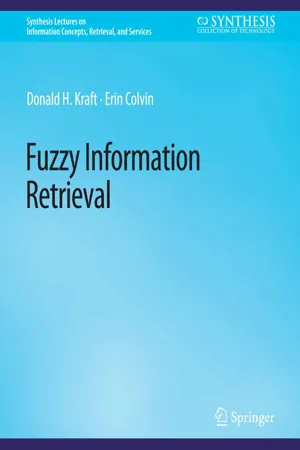
- English
- PDF
- Available on iOS & Android
Fuzzy Information Retrieval
About this book
Information retrieval used to mean looking through thousands of strings of texts to find words or symbols that matched a user's query. Today, there are many models that help index and search more effectively so retrieval takes a lot less time. Information retrieval (IR) is often seen as a subfield of computer science and shares some modeling, applications, storage applications and techniques, as do other disciplines like artificial intelligence, database management, and parallel computing. This book introduces the topic of IR and how it differs from other computer science disciplines. A discussion of the history of modern IR is briefly presented, and the notation of IR as used in this book is defined. The complex notation of relevance is discussed. Some applications of IR is noted as well since IR has many practical uses today. Using information retrieval with fuzzy logic to search for software terms can help find software components and ultimately help increase the reuse of software. This is just one practical application of IR that is covered in this book.
Some of the classical models of IR is presented as a contrast to extending the Boolean model. This includes a brief mention of the source of weights for the various models. In a typical retrieval environment, answers are either yes or no, i.e., on or off. On the other hand, fuzzy logic can bring in a "degree of" match, vs. a crisp, i.e., strict match. This, too, is looked at and explored in much detail, showing how it can be applied to information retrieval. Fuzzy logic is often times considered a soft computing application and this book explores how IR with fuzzy logic and its membership functions as weights can help indexing, querying, and matching. Since fuzzy set theory and logic is explored in IR systems, the explanation of where the fuzz is ensues.
The concept of relevance feedback, including pseudorelevance feedback is explored for the various models of IR. For the extended Boolean model,the use of genetic algorithms for relevance feedback is delved into.
The concept of query expansion is explored using rough set theory. Various term relationships is modeled and presented, and the model extended for fuzzy retrieval. An example using the UMLS terms is also presented. The model is also extended for term relationships beyond synonyms.
Finally, this book looks at clustering, both crisp and fuzzy, to see how that can improve retrieval performance. An example is presented to illustrate the concepts.
Tools to learn more effectively

Saving Books

Keyword Search

Annotating Text

Listen to it instead
Information
Table of contents
- Cover
- Copyright Page
- Title Page
- Contents
- Preface
- Acknowledgments
- Introduction to Information Retrieval
- Modeling
- Source of Weights
- Relevance Feedback and Query Expansion
- Clustering for Retrieval
- Uses of Information Retrieval Today
- Bibliography
- Author Biographies
Frequently asked questions
- Essential is ideal for learners and professionals who enjoy exploring a wide range of subjects. Access the Essential Library with 800,000+ trusted titles and best-sellers across business, personal growth, and the humanities. Includes unlimited reading time and Standard Read Aloud voice.
- Complete: Perfect for advanced learners and researchers needing full, unrestricted access. Unlock 1.4M+ books across hundreds of subjects, including academic and specialized titles. The Complete Plan also includes advanced features like Premium Read Aloud and Research Assistant.
Please note we cannot support devices running on iOS 13 and Android 7 or earlier. Learn more about using the app